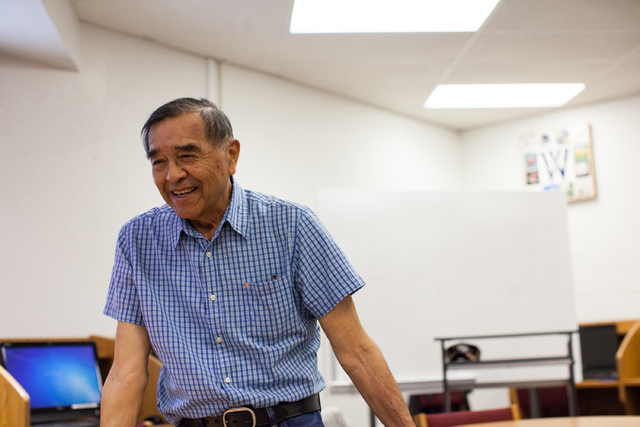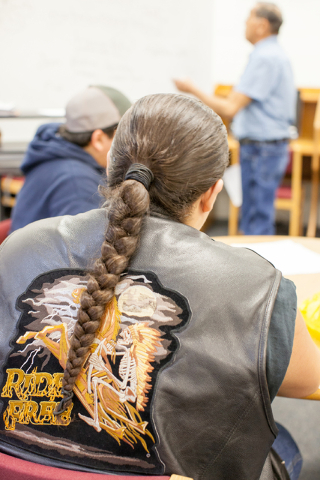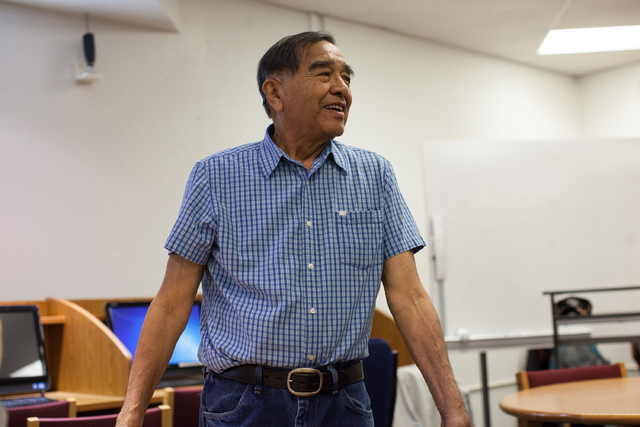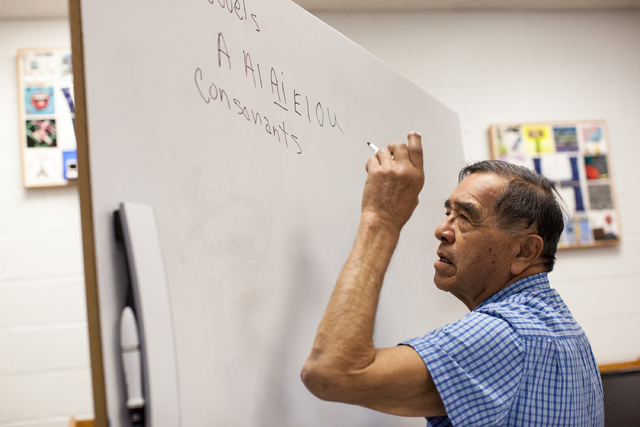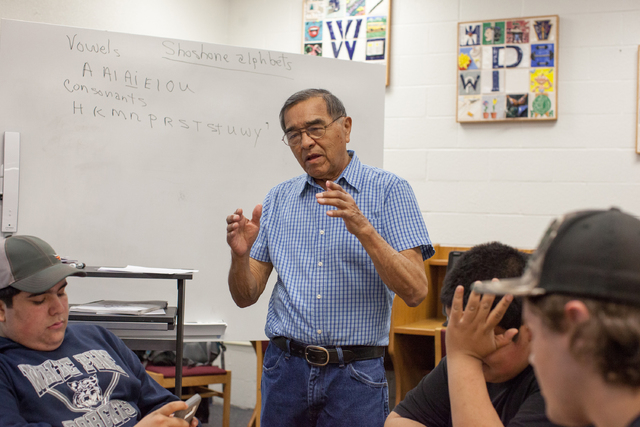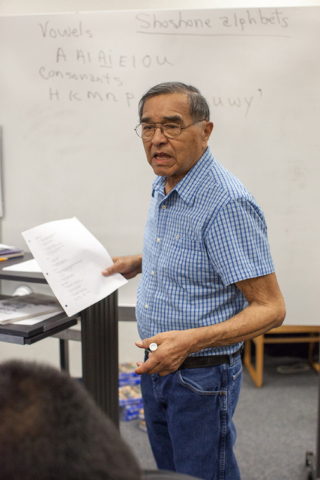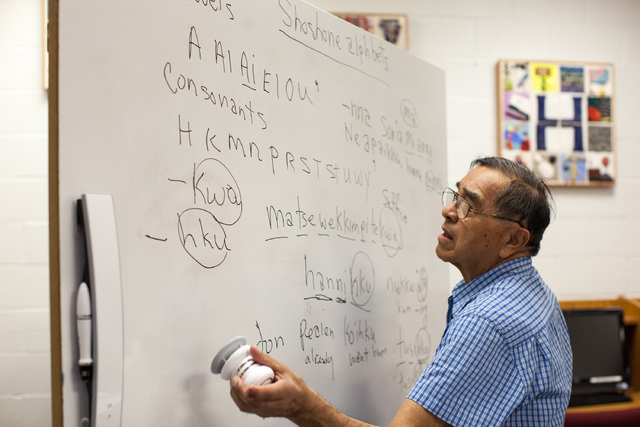Shoshone tribal member passes on native language — PHOTOS
ELY — Each weekday morning Boyd Graham rises at 4:30 a.m., leaving the Duckwater Shoshone reservation in the vast Railroad Valley to embark on a 150-mile round-trip journey.
He’s an unofficial emissary for his tribe, its cultural and linguistic interpreter.
At age 77, when most men his age have significantly slowed, this slender retiree with thick, overarching eyebrows teaches a Shoshone language class at White Pine High School — offering lessons not only to Native American youth but also anyone curious about the habits and sounds of his ancient culture.
“E hakanni,” (pronounced Uh ah gah neh) he tells four teenagers each afternoon when they meet in a corner of the school’s busy library. And when the class bell rings and they rise to leave, he bids them goodbye: “Abishai.” (Ah bee shy.)
This semester, the students are a mixed group, all boys, a pair with Native American heritage and two non-Indians who work just as hard to get their pronunciations right.
Chris Hill, a husky 17-year-old who wants to play college football, took the class as an elective: “I didn’t want to take Spanish. I wanted to stick with a language from the American territory.”
Prompted to say a few words in Shoshone, he freezes.
“Help get me started here, Boyd,” he says before launching into a sentence with a translation that starts with “Your father’s hat … ”
In walks Tavix Robertson, a sun-bronzed teen, his long hair pulled into a tight ponytail. The back of his jacket bears an image of a skeleton in a feather headdress riding a horse over the saying “Ride Free.” He is one-third Native American — half of that lineage Shoshone, the other Paiute.
“I just thought it’d be cool to learn about our culture,” he said softly.
They have come to the right place.
Like many Native Americans from his generation, Graham worries that his language is dying. When he was young, tribal elders gathered to tell stories and interpret legends, but radio and television and the invasion of English put a stop to most of that.
Some tribes have battled to keep their language relevant in a modern world: In 2014, Navajo elders in Arizona blocked a candidate for tribal presidency because he could not speak the native tongue fluently.
Graham is trying to school the young before they reach adulthood. “We want to get them interested in our language and way of living,” he said. “For our own youth, it’s a way to instill pride and get them away from drugs and alcohol.”
Born in Tonopah, Graham is one of nine children. His father, Raymond Graham, was a miner and tribal leader who was instrumental in founding the Duckwater Shoshone reservation about 220 miles north of Las Vegas.
For generations, the Shoshone were landless, working on privately owned ranches and mines to earn a living. In 1940, Raymond Graham helped negotiate the tribe’s move to an isolated expanse of land where more than 150 Shoshone still live.
Like most of his generation, Graham left the reservation as a young man. He spent time in the U.S. Navy and lived in San Francisco. But he kept his language alive, speaking with his parents, grandmother and great-grandmother, who knew almost no English. He returned to Duckwater to allow his father to retire from cattle ranching.
Then, in 2000, he became a language instructor at the Shoshone tribal center in Ely, working with members who had married outside the tribe and forgotten their tongue.
In 2010, Graham approached the high school about teaching a class. Principal Adam Young immediately liked his organic teaching methods.
“Boyd takes students on walks, teaches them little by little,” he said. “Some take the class multiple years because they like him so much.”
Shoshone tribal member Virginia Sanchez also likes what she sees. “Boyd is almost 80,” she said. “For him to have the stamina to teach young people at his age is pretty incredible.”
She said Graham carries on a vital Shoshone tradition. “Our creation story says if you take care of your region, it will take care of you,” she said. “Part of that means passing on the language of our elders. Boyd carries that with him.”
Graham’s wife, Lillian, said the couple can’t go anywhere without running into one of his students. “These kids will wave at him, and I’ll say, ‘Who’s that?’ He’ll just say, ‘One of my kids,’” she said. “He’s known all over Ely. He’s respected because of what he does with the language.”
Lillian, a Shoshone who grew up in Reno, doesn’t speak the language — a fact that gives her husband ammunition to tease her. “He thinks it’s funny,” she said. “I learned a little Japanese so I speak Shoshone with an accent. He gets a kick out of the way I pronounce things. So I tell him, ‘If you don’t like it, teach me.’”
One day, Graham showed up for class in blue jeans and a blue-checkered short-sleeve shirt, an outfit topped off by a hat with an eagle adorned by a war feather and inscribed “Native Pride.” As he waited for his flock, he told about the dangers of driving Nevada’s outback before dawn.
Antelopes have rammed and dented his car. Deer have smashed into his headlights. Jackrabbits skitter under his tires. Once, he was struck by two deer at once. He knew the animals were dead, but didn’t stop to salvage the meat; he didn’t want to be late for school.
He knows learning spoken Shoshone is not easy. For one, it requires restricting air in what’s known as a glottal stop. T is pronounced as D, and P is spoken as B.
As a result, the dropout rate is often high. But he’s been amazed by some non-Indian students, such as the Chinese-American teen with a gift for pronunciation. “Perhaps Shoshone is close to his native language,” Graham said. “He was amazing.”
This semester, he knows his students are rowdy teens. The class first met in a health-care classroom equipped with gurneys and wheelchairs. But the teens raced around on the equipment so he moved them to the library to keep their attention.
The gambit worked.
Graham hasn’t taught students any Shoshone cuss words, but they know some anyway.
Left-handed, he writes the alphabet onto a white grease board as other students using the library look on in curiosity.
One of Graham’s students briefly fiddles with his cellphone but then puts it away.
“Are we gonna have a quiz on the animals next week?” another asks.
They pay attention, taking notes, repeating each word out loud.
Their instructor smiles.
He knows that somehow, somewhere, his long-gone elders are happy.



